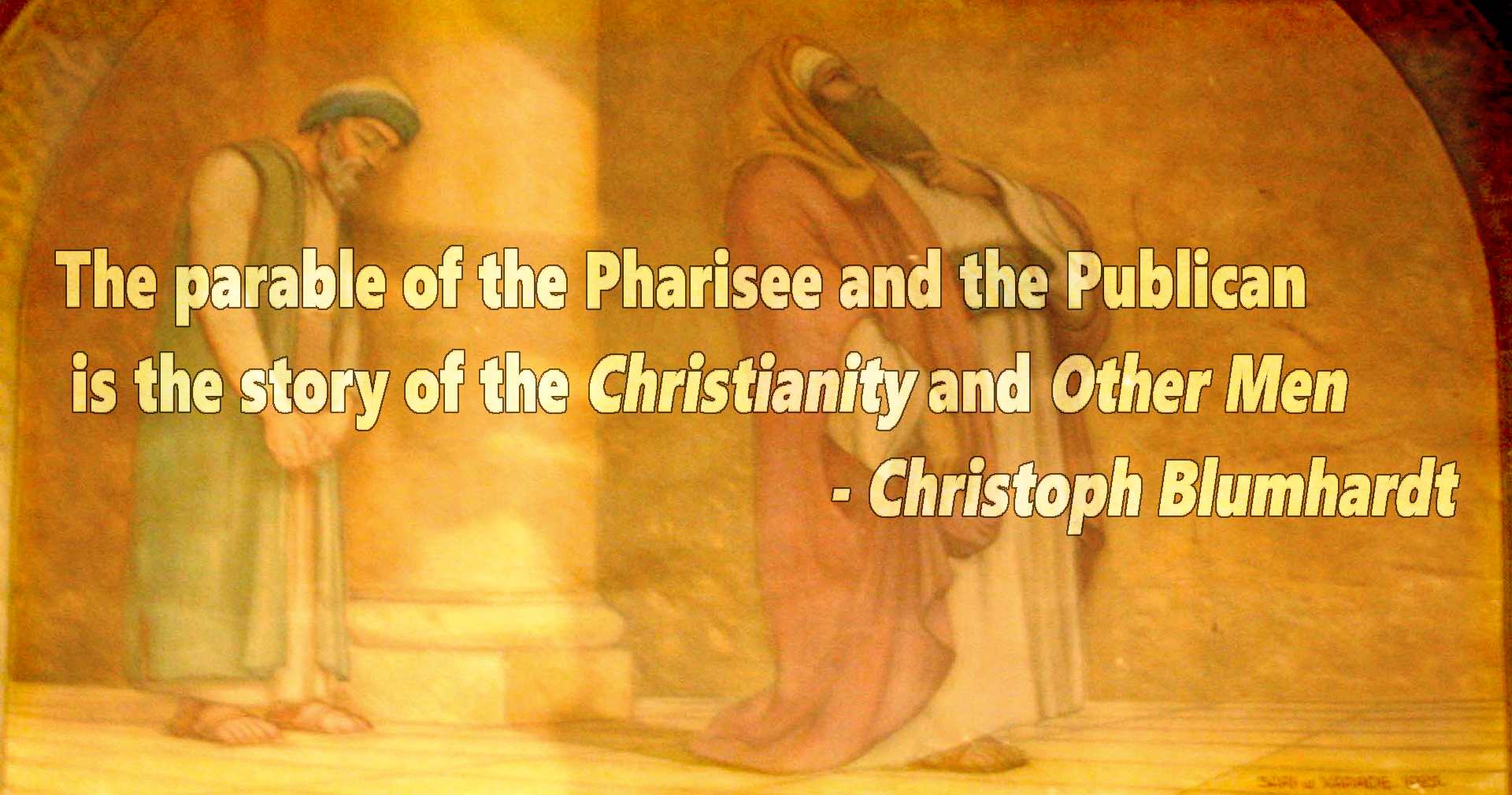Helmut Gollwitzer's The Way of Life: Sermons in a Time of World Crisis contains a sermon from 1979 on the Parable of the Pharisee and Publican (Tax Collector), and in it, Gollwitzer summarizes Christoph Blumhardt's interpretation of this parable. Christoph Blumhardt and his father Johann Blumhardt are known for their Christian Universalism, or the hope in Christ that all may be saved. Jesus has a way of evading our characterizations and shaking free of our conclusions. Gollwitzer points out that in the codex Bezae (D), the word 'parable' does not in Luke 18:9-14, indicating that the redactor believed that Luke was describing a real event witnessed by Jesus rather than parable he had devised. The consequence is that the meaning of this passage may be understood in a different context than the other parables. Gollwitzer then utilizes Christoph Blumhardt's alternate explanation of this parable to retell this story and casting Christianity as the Pharisee and all the non-Christian other men of the world, as the Publican. This brings a universal scope to a parable that typically is preached by many to conclude a double judgement of the saved humble Publican vs the self-righteous Pharisee.
Christoph Blumhardt, that incomparable witness to God in Swabia in the last century, preached on the same eleventh Sunday after Trinity in August 1891 a sermon on this text. In it he was concerned with these questions. But he did not, as I have done thus far, and as is customary, concerning himself with the behavior of individuals. Being a man of the Kingdom of God, who concerned himself with the universal, for him the Pharisee and the tax collector were a picture of the history of Christianity to the present day. He saw the Church and Christians in the role of the Pharisees, arrogantly exalting themselves above the "other men", the heathen and the Jews, the atheists and the communists, sunning themselves in the splendor of their higher religion, their higher culture, and their higher ethic. But he saw on the other hand how this Church and we Christians will fare when God passes judgement not only on the others, but on us too, when he takes account of out way of life and our failure, when he relates our way of life to the misery of which Christians have brought to other people, often in the name of Christianity and God; the extirpation of the Indians, and the enslavement of negroes, the burning of heretics and witches, the atrocities of colonialism, the crusades of past days and war armaments of today in defense of Christian culture against its enemies, and the simple fact we, the so-called Christian peoples of Europe and America, take possession of the greater part of the world's riches for our prosperous way of life, and the rest perish in hunger and misery and tyranny. When the moment of truth comes, then we shall move from the place of the Pharisees to the place of the tax gatherer, and then it is we Christians who will beat our breasts in despair, "God, be merciful to us Christians!"
And thus at last, says Jesus, at last you are right with God: not so long as, like the Pharisee, you thanked God for God's gifts, but left the others in the lurch, or even despised them, did nothing for them, and at the same time deceived yourselves about your superiority. But now, when you recognize the truth, the truth of your failure, the truth that you especially, beyond all others, have played false with God, and then in despair, because you can find no other means of escape, cry "God be merciful to us Christians!"
Then we are right with God. Then he has got us to the point where we no longer in arrogance and self-righteousness see ourselves standing above other people, and either despise and reject the "other people", or wish to dominate them and shape them to our model. Then we become of use to serve his love that seeks men out, then we shall invest our gifts, for which we thank him, to this end, and discover new possibilities, better than hitherto, to live with and for other men. And may what Jesus says to us through this story help us to do so!
Gollwitzer, Helmut. The Way to Life: Sermons in a Time of World Crisis. Trans. David Cairnes. Edinburgh: T. & T. Clark, 1981. 68-69. Print.




Leave a comment